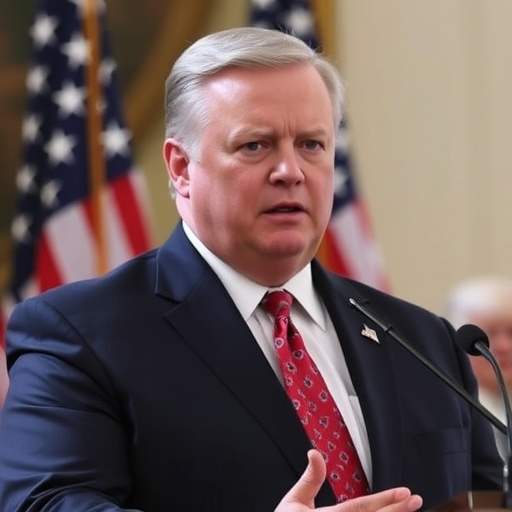In a critical update amid escalating tensions over the ongoing government shutdown, House Speaker Mike Johnson announced that President Donald Trump is actively reviewing options to ensure that U.S. troops receive their paychecks on time, despite the fiscal impasse gripping Washington. This revelation comes as federal workers, including military personnel, face mounting uncertainty, with the House postponing key votes that could have addressed the crisis.
- Johnson’s Stark Warning: Troops’ Paychecks Hang in the Balance
- Trump’s Hands-On Approach: Vetting Emergency Measures for Military Funding
- House Stalls on Votes: Canceled Sessions Fuel Shutdown Frustrations
- Troops on the Frontlines: Personal Stories of Shutdown Strain
- Bipartisan Pushback and Future Pathways: What Lies Ahead for Shutdown Resolution
Johnson’s Stark Warning: Troops’ Paychecks Hang in the Balance
House Speaker Mike Johnson, a staunch ally of President Donald Trump, delivered a sobering message from the halls of Congress on Thursday, emphasizing the administration’s commitment to safeguarding military families during what he described as an ‘unprecedented shutdown.’ Speaking to reporters after a closed-door meeting with Republican leadership, Johnson stated, ‘President Trump is personally reviewing every viable option to make sure our brave troops get paid. This shutdown is not of our making, but we will not let it harm those who protect us.’ His words underscore the gravity of the situation, where over 2 million active-duty service members and hundreds of thousands of reservists could miss their January pay if no resolution is reached.
The shutdown, now in its third week, stems from deep partisan divides over border security funding and disaster relief packages. Johnson, elected as Speaker in October 2023 following a contentious intra-party battle, has positioned himself as a bridge-builder, but critics argue his reluctance to compromise has prolonged the stalemate. According to data from the Congressional Budget Office, previous shutdowns have cost the economy billions, with the 2018-2019 episode alone delaying pay for 800,000 federal workers and indirectly affecting military support staff.
Johnson’s announcement highlights a pivotal moment for the Republican-led Congress. With the House canceling votes on a stopgap funding bill scheduled for this week, lawmakers are scrambling to find common ground. ‘We can’t vote on half-measures,’ Johnson told The Washington Post in a follow-up interview. ‘The President needs comprehensive solutions that secure our borders and honor our troops.’
Trump’s Hands-On Approach: Vetting Emergency Measures for Military Funding
President Donald Trump, known for his ‘America First’ agenda, has wasted no time in addressing the plight of the troops caught in the shutdown crossfire. Sources close to the White House reveal that Trump has convened a task force of top advisors, including Defense Secretary Lloyd Austin and budget experts, to explore legal and executive pathways for disbursing military pay. While specifics remain under wraps to avoid political exploitation, insiders suggest options could include redirecting funds from non-essential programs or invoking emergency powers under the Pay Our Military Act of 2010, which was enacted post-2013 shutdown to prioritize troop compensation.
Trump himself took to social media platform Truth Social late Wednesday, posting, ‘Our incredible soldiers, sailors, airmen, and Marines will NOT go unpaid on my watch. Reviewing all options NOW to get them their hard-earned money during this Democrat-induced shutdown!’ This direct intervention reflects Trump’s history of prioritizing military issues; during his first term, he increased defense spending by 20% and signed the National Defense Authorization Act annually without fail.
Experts like former Pentagon comptroller David Norquist note that while the act provides a framework, implementation requires congressional buy-in. ‘The President can act swiftly, but long-term fixes demand bipartisan action,’ Norquist said in an interview with CNN. Statistics from the Department of Defense indicate that unpaid troops could lead to a 15-20% drop in morale and readiness, with ripple effects on global operations from Ukraine to the Indo-Pacific.
The urgency is palpable: A Pentagon memo circulated internally warns of potential delays in everything from base maintenance to family support programs. Trump’s review process, expected to conclude by early next week, could involve reallocating $10-15 billion from discretionary funds, though legal challenges from Democrats are anticipated.
House Stalls on Votes: Canceled Sessions Fuel Shutdown Frustrations
As House Speaker Mike Johnson navigates the shutdown’s fallout, the decision to cancel upcoming votes has drawn sharp criticism from both sides of the aisle. Originally slated to debate a $1.2 trillion omnibus bill that included military pay assurances, the House floor sessions were abruptly halted Wednesday afternoon. Johnson cited ‘insufficient support’ as the reason, pointing fingers at Senate Democrats for blocking progress on immigration reforms tied to the funding package.
This isn’t the first time votes have been derailed under Johnson’s speakership. In December, a similar funding clash led to a 15-hour marathon session that ended in deadlock. According to Politico reporting, at least 20 House Republicans are wavering on the current bill, demanding stricter border wall allocations—a nod to Trump’s campaign promises. ‘We’re not caving to open-border policies,’ one anonymous GOP lawmaker told the outlet.
The cancellation has real-world consequences. Federal contractors at military bases, numbering over 500,000, are furloughed without pay, exacerbating supply chain issues for troops. A survey by the Armed Forces Insurance agency found that 60% of military families live paycheck-to-paycheck, making the shutdown’s impact ‘devastating,’ as one Army spouse shared on social media.
Minority Leader Hakeem Jeffries (D-NY) blasted the move, saying, ‘This is leadership failure. Our troops deserve better than political games.’ With the shutdown projected to cost $1.5 billion per week, pressure mounts for Johnson to reconvene the House by Monday.
Troops on the Frontlines: Personal Stories of Shutdown Strain
Beyond the Beltway rhetoric, the government shutdown is hitting troops and their families hardest. At Joint Base Lewis-McChord in Washington state, Army Sgt. Maria Gonzalez, a single mother of two, described her anxiety to local NBC affiliate: ‘We’ve budgeted for this, but missing pay means choosing between groceries and the kids’ school supplies. President Trump promised to have our backs—hoping it’s true.’
Gonzalez’s story is emblematic of the broader crisis. The U.S. military, with 1.3 million active-duty personnel, relies on timely pay for operational stability. During the 35-day 2018 shutdown, over 300,000 civilian DoD employees went unpaid, leading to food bank lines at bases nationwide. This time, advocates fear similar scenes, with the Fisher House Foundation reporting a 40% spike in requests for emergency aid.
House Speaker Mike Johnson acknowledged these human elements in his presser, vowing, ‘No family wearing the uniform should worry about bills while politicians bicker.’ Yet, data from the Government Accountability Office shows shutdowns disproportionately affect lower-ranking enlisted personnel, who earn a median of $35,000 annually and often serve in high-cost areas like San Diego or Virginia Beach.
Veterans’ groups are mobilizing too. The American Legion issued a statement urging swift action: ‘Troops’ pay is non-negotiable. Delay harms national security.’ Personal anecdotes flood social media, with hashtags like #PayOurTroops trending, amplifying calls for President Donald Trump and Speaker Johnson to act decisively.
Bipartisan Pushback and Future Pathways: What Lies Ahead for Shutdown Resolution
The shutdown’s shadow looms large over upcoming legislative battles, with both parties eyeing midterm implications. Democrats, led by Senate Majority Leader Chuck Schumer, have introduced a clean funding bill that excludes immigration riders, but House Republicans under Mike Johnson remain firm. ‘We’re close to a deal that protects troops and enforces the law,’ Johnson teased, hinting at Trump’s potential veto override threats if concessions are made.
Looking forward, analysts predict a resolution could come via a short-term continuing resolution (CR) extending funding through March, buying time for comprehensive talks. The Bipartisan Policy Center estimates a prolonged shutdown could shave 0.2% off GDP growth in Q1 2024, with military readiness scores dropping by up to 10% per delayed pay cycle.
President Donald Trump’s options review might culminate in an executive order by week’s end, but experts warn of court battles. As one Hill staffer put it, ‘This tests Johnson’s speakership and Trump’s deal-making prowess.’ For troops, the wait continues, but Johnson’s assurance signals a potential lifeline. Stakeholders from the Pentagon to Wall Street watch closely, knowing the stakes extend far beyond paychecks to America’s global standing.
In the coming days, expect intensified negotiations, possibly involving Trump’s direct involvement in Capitol Hill meetings. If successful, it could mark a win for the administration; failure risks deepening divisions ahead of key foreign policy deadlines, like Ukraine aid packages. The path forward demands compromise, with troops’ welfare at its core.








